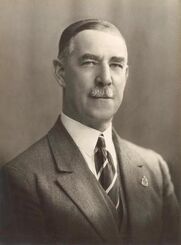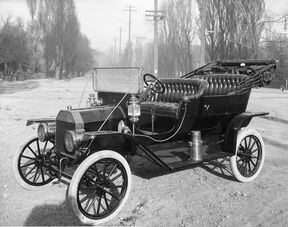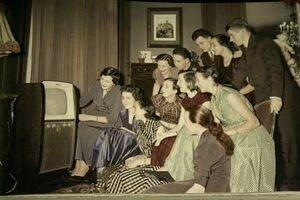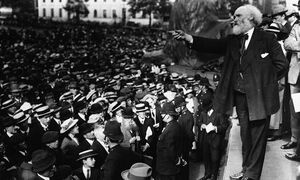
Owen Galloway of Indiana.
Owen Galloway (1884 - 1948) was the president of North American Motors, the originator of the Galloway Plan, and the founder of the Galloway Trust.
North American Motors[]
Galloway was a member of the wealthy and powerful Galloway family, descendants of Joseph Galloway. Born in the Michigan City suburb of Galloway Point, Galloway was privately tutored before attending Oxford University. Graduating in 1905, Galloway joined his father's locomobile firm, Galloway Locomobile. Galloway came up with the idea of producing low-cost locomobiles for a mass market. Samuel Galloway initially opposed the idea, but became a supporter. The Dickinson first appeared in 1915, had the simplest mechanism of any locomobile in the C.N.A., and sold for N.A. £923. By the time Galloway succeeded his father as president of Galloway Locomobile in 1919, the company was producing 29% of the country's locomobiles, most of them Dickinsons.

1922 Galloway Dickinson with vulcazine engine.
In his first two years as president of Galloway Locomobile, Galloway bought out seven other locomobile firms, many of them near bankruptcy due to the popularity of the Dickinson, and formed North American Motors, the largest locomobile firm in the C.N.A. In 1921 the company's engineers produced an improved vulcazine engine, and N.A.M. began shifting production from steam locomobiles to vulcazine models. By 1925, the vulcazine-engine Dickinson had become the most popular car in the world.
As president, Galloway also formed a petroleum affiliate, which initially sought to find new sources in the C.N.A. By 1922, North American Fuel was competing with Kramer Associates to find petroleum deposits throughout the world, and was operating a growing chain of service stations throughout the C.N.A. Galloway also founded North American Finance to encourage locomobile purchases, and North American Inns to provide motorists with inexpensive lodgings while on the road. As a result of Galloway's expansion of the company, by 1922 N.A.M. was the largest company in North America, and the second-largest in the world.
The Galloway Plan[]
Galloway's most important enterprise was his sponsorship of the Galloway Playhouse radio program, which presented plays drawn from contemporary and classic novels. In September 1922 Galloway Playhouse also began appearing on vitavision, causing sales of vitavision sets to climb quickly. By the end of 1922, an estimated 40 million North Americans listened to, or watched, one or the other.

A group in Indiana watches Galloway Playhouse.
On 25 December 1922, following a presentation of Charles Dickens' The Christmas of the Magi, Galloway gave the Galloway Speech, in which he announced the creation of the Galloway Trust, which would subsidize emigration within and from the C.N.A. An estimated 60 million North Americans heard or saw the Galloway Speech. Reaction to the Galloway Plan was mixed, although Howard Washburne of the League for Brotherhood called it "worthy of study, and the child of a man of unquestionable sincerity."
This made Galloway the most popular public figure in the C.N.A., and although he declined to run for Governor-General in 1923, he indirectly influenced the race when the Liberal Party candidate, Henderson Dewey, was able to convince voters that he was Galloway's preferred candidate. As the Galloway Plan unfolded in 1923, Galloway's weekly addresses on the Galloway Playhouse became a ritual with millions of citizens. At first, the addresses dealt with the Plan, but by the time the Galloway Trust was established and the Plan put into effect in February 1923, Galloway was using his Playhouse addresses to articulate his personal philosophy.
Galloway was a conservative man with a strong belief in the power of tradition. Although he recognized the need for change, he preferred a cautious approach to social change. At the same time, he was suspicious of institutions, especially government, and on one occasion suggested the regular "peaceful dissolution of our governments, churches, corporations, clubs -- all organizations to which we belong -- and a fresh start for each, in which needed changes may be made." In 1925, Professor Ernest Armstrong of Burgoyne University wrote, "No one denies Mr. Galloway's beauty of spirit. It would be pleasant, however, to find a brain to match the soul."
Peace Activist[]
When Galloway announced his opposition to Governor-General Douglas Watson's armament program on 1 July 1934, it turned public opinion against Watson overnight, and almost led to his impeachment. Galloway had never taken a political stance before, but said that "conditions are such that silence might be taken as assent, and this must not be." Galloway called Watson's armament program "unwise, unnecessary, and more likely to bring war than to prevent a conflict. He urged the Grand Council to reject Watson's proposals, and devote their efforts to the "more pressing internal problems that face us today."

Anti-war protest in 1937.
In the late 1930s, an international arms race seemed to be bringing the world to the brink of war, and a spontaneous anti-war movement appeared all over the world in the summer of 1937. Galloway became the leader of the North American peace movement, and he organized a "world conference for peace" in Madrid, Spain on 8 September 1937 which attracted delegates from almost every nation in the world. Turnout was large, but friction between rival peace groups led to a riot on 11 September, after which Spanish Premier Aldo Figueroa ordered the delegates out of Spain. Despite the failure of the conference, Galloway predicted that "any nation that goes to war will find itself engaged in two conflicts -- one with the foreign enemy, the other with its own people."
After the Global War broke out in October 1939, Governor-General Bruce Hogg approached Galloway about serving as an official government representative in prospective North American efforts to mediate a peace. Galloway agreed to do so "when and if North America's good offices are needed to effect a peace." However, contrary to Hogg's expectations, the warring nations did not quickly exhaust themselves. Instead, the Germans won a series of quick victories against the British, French, and Turks, and the war continued for the rest of Galloway's life.
Galloway died in 1948, and the eulogy at his funeral was given by Council President James Billington.
Sobel's sources for the life of Owen Galloway are Galloway's own Selected Addresses (New York, 1935), as well as Milton Hart's Galloway: The Other Side (Burgoyne, 1929); Thomas Kelley's The Peace Crusade of 1937: A Study in Group Behavior (New York, 1949); Edwin Foster's The Business Career of Owen Galloway (New York, 1961); Dwight Pendleton's The Galloway Years (New York, 1964); Lewis Sayers' The Galloway Plan: The Modern Moses (New York, 1966); Foster and John Collins' Galloway (New York, 1967); and Richard Maltz's Better Than Any of Us? The Ambitious Galloway (New York, 1970).
This was the Featured Article for the week of 25 March 2013.
